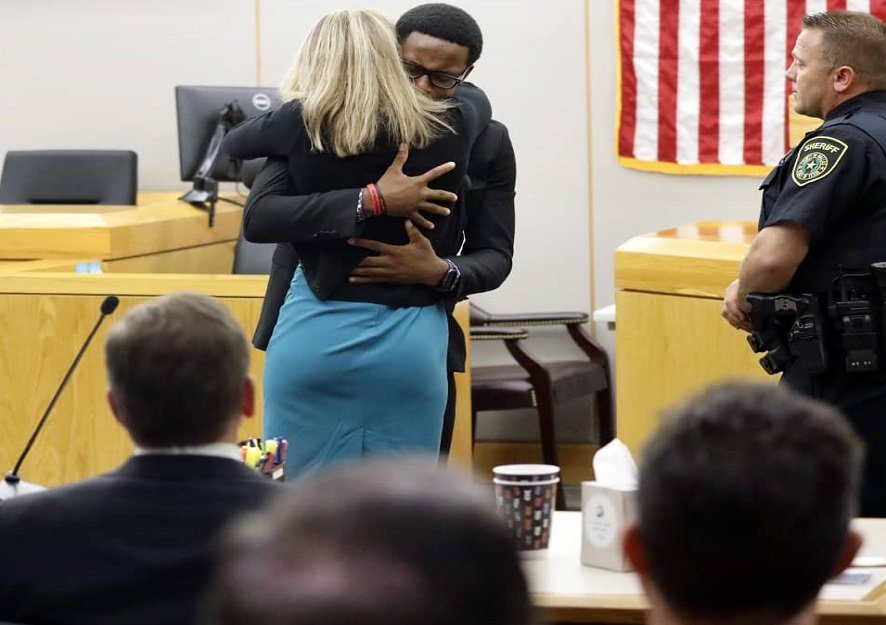Amber Guyger, the ex-police officer who had shot and killed an unarmed black man in his own apartment in 2018, has surprisingly appealed against her sentence.
Guyger, who was with Dallas Police, was sentenced to 10 years in prison in October 2019 on the charge of murder. Her attorneys had argued that she shot Botham Jean on September 6, 2018, as a means of self-defense.
Guyger had returned from work to the apartment she thought was hers. She claimed she found the door to the apartment ajar and found Jean inside, watching the TV from the couch and eating ice cream.
She opened fire, killing him on the spot. But Jean’s apartment had been directly above Guyger’s.
At her sentencing, Guyger was famously forgiven by Brandt Jean, a brother of the man she killed. Brandt hugged Guyger for a while in a photographic moment that has come to be synonymous with the case.
But Brandt’s absolution of Guyger’s sins was greeted with disbelief and anger by many black people who took to social media. At the time, Brandt told CNN he wanted “to lead by example” as part of efforts to heal a country that is deeply divided along racial lines.
“I really don’t want this to happen again,” he added. “As much as I want people to be forgiving, I don’t want there to be another brother who has to forgive.”
Brandt was cognizant of the fact that bias against black men could have fatal consequences for them in the hands of law enforcement and was hopeful that his decision to forgive Guyger will be read as benefit of doubt.
But Guyger’s appeal states that since Guyger confronted Jean under the impression that she was in her apartment, there was not enough evidence to support “culpability for murder”.
The appeal said “her mistaken belief negated the culpability for murder because although she intentionally and knowingly caused Jean’s death, she had the right to act in deadly force in self-defense since her belief that deadly force was immediately necessary was reasonable under the circumstances.”
As perhaps expected, Jean’s family have been left disappointed by Guyger’s appeal against her sentence.
Jean family attorney S. Lee Merritt, was quoted saying: ‘”After admitting her crime and asking Botham Jean’s family for mercy– Guyger’s actions in filing this appeal reflect someone who is not repentant but instead was hoping to play on the families sympathies at the time that they were most vulnerable.”
Among a few, this development may be cited as a good example of the head-splitting dilemma that black people have to overcome between remembering the wrongs they have endured and looking forward towards a fairer world. But the temptation exists to treat Guyger’s appeal as an isolated case.
We may also be warned to observe restraint since the appeal has not yet been heard in court and a judge has not yet decided its merits. But to wait for judgement may not do the trick.
When Brandt embraced Guyger in forgiveness and defended his action against the negative remarks of many black people, he did lead by example. In that embrace too, as much as the two people might not have thought about it, they represented two greater parties in the wider scheme of American life.
As black people are continuously told that slavery, colonization and Jim Crow “happened long ago” even though they continue to feel the burden of asymmetrical power relations, every opportunity for true progress must be utilized by those who ask and demand forgiveness and forgetfulness. Of course, this does not mean that Guyger’s right to recourse should be lost in search of some greater cause.
What is at stake here is the healing condition that needs to exist because frankly, an unfortunate signal has been sent to those who are not interested in forgiving or forgetting. Or even to those who believe might is right and their history of subjugating other people spells their superiority.
As things stand, those who were skeptical of the show of forgiveness will feel they possess the grounds to remind Brandt, “we warned you”.










